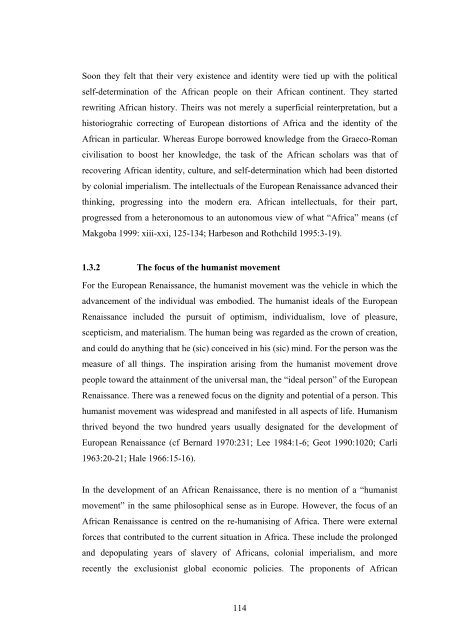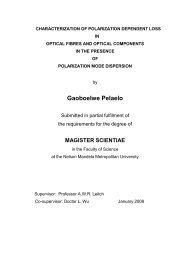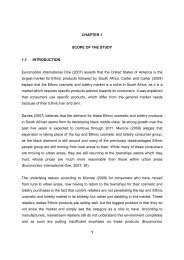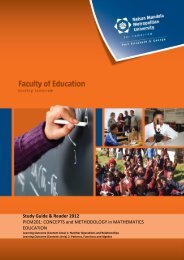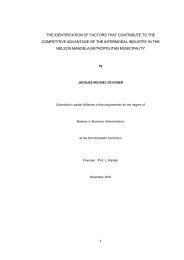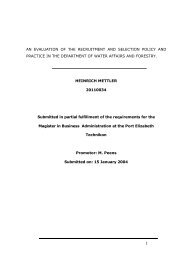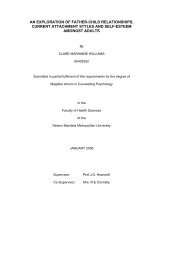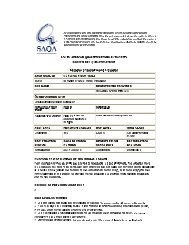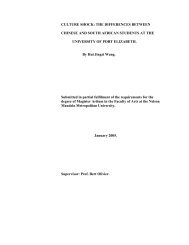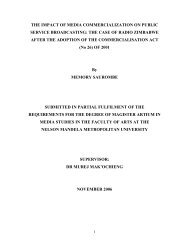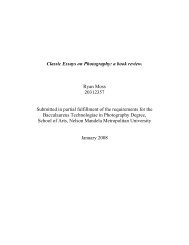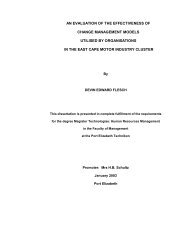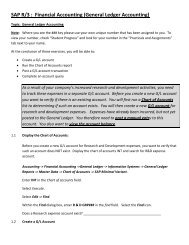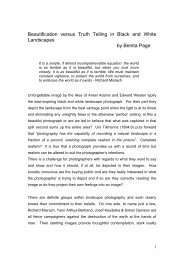- Page 4 and 5:
study, to embrace virtuous living a
- Page 6 and 7:
1.3 Comparative analysis of “enha
- Page 8 and 9:
SUMMARYThe structure of this study
- Page 10 and 11:
INTRODUCTIONMoral Formation and the
- Page 12:
My father often warned me to watch
- Page 15 and 16:
Even now, some Euro-Western “forc
- Page 17 and 18:
economically degenerate country in
- Page 19 and 20:
of a moral collapse seem to intensi
- Page 21 and 22:
(Christ) has the power to withstand
- Page 23 and 24:
Wisdom theology is also known as sa
- Page 25 and 26:
“primitive” and “traditional
- Page 27 and 28:
e missing. It is therefore entitled
- Page 29 and 30:
CHAPTER 1A Contextual Analysis: the
- Page 31 and 32:
Helm, in defining “renaissance”
- Page 33 and 34:
The spirit of the Italian Renaissan
- Page 35 and 36:
Lee goes on to describe the view of
- Page 37 and 38:
theoretical and practical knowledge
- Page 39 and 40:
the humanist concepts dominated the
- Page 41 and 42:
matters social and political from G
- Page 43 and 44:
your nature. We have set you at the
- Page 45 and 46:
think of himself as a humanist. He
- Page 47 and 48:
aspirations, and longings of the hu
- Page 49 and 50:
1.1.1.4 Political organizationThere
- Page 51 and 52:
1961:22-23; Burke 1987:214; Waley 1
- Page 53 and 54:
made it difficult to maintain a dis
- Page 55 and 56:
disasters, secular authorities join
- Page 57 and 58:
These views on moral deterioration
- Page 59 and 60:
factional conflict. Some of his los
- Page 61 and 62:
Phillips concludes:Erasmus’ impor
- Page 63 and 64:
esult, France produced some renowne
- Page 65 and 66:
(iii)(iv)There was a general lack o
- Page 67 and 68: sponsored by Prince Henry the Navig
- Page 69 and 70: with the revival of the African con
- Page 71 and 72: As there is an international feelin
- Page 73 and 74: 1.2.3 The striving for political se
- Page 75 and 76: achieved if Africans rediscover who
- Page 77 and 78: The goal for the unification of Afr
- Page 79 and 80: Makgoba reiterated some of the bene
- Page 81 and 82: Mbeki has often alluded to the impo
- Page 83 and 84: ooks, including “Native Life in S
- Page 85 and 86: Mbeki takes further the struggle of
- Page 87 and 88: Since the end of colonialism, Afric
- Page 89 and 90: 1.2.6.1 HIV/AIDS as complex moral c
- Page 91 and 92: evil of racism. These tragedies led
- Page 93 and 94: I have noted elsewhere that HIV/AID
- Page 95 and 96: the highest infection rate, and yet
- Page 97 and 98: wait-and-see scenario. A study done
- Page 99 and 100: poverty, control diseases, and redu
- Page 101 and 102: African leaders should find other w
- Page 103 and 104: 1.2.6.5 DiseasesApart from HIV/AIDS
- Page 105 and 106: HIV is transmitted, and we need the
- Page 107 and 108: Most educated Africans from mission
- Page 109 and 110: However, multiple factors contribut
- Page 111 and 112: universally applicable, for theorie
- Page 113 and 114: nation is under the threat of famin
- Page 115 and 116: een realised. The epoch for the ove
- Page 117: 1.3 Comparative analysis of “enha
- Page 121 and 122: There is also a possibility that mo
- Page 123 and 124: 1.3.5 The paradox of warsWe have no
- Page 125 and 126: successes come after the devastatin
- Page 127 and 128: Barney Pityana and Lesiba Teffo hav
- Page 129 and 130: challenges (1995: 1-13) and Katongo
- Page 131 and 132: CHAPTER TWOA Philosophical Analysis
- Page 133 and 134: (i)(ii)Moral law requires that genu
- Page 135 and 136: 2.1.2 Utilitarianism ethical theory
- Page 137 and 138: (iv)sense of a person’s conceptio
- Page 139 and 140: work of Maria Antonaccio, who revie
- Page 141 and 142: This is to say that there is, in my
- Page 143 and 144: Thirdly, Murdoch affirmed “a refl
- Page 145 and 146: Murdoch’s moral thought remained
- Page 147 and 148: In their presentation is vested the
- Page 149 and 150: The pursuit of human flourishing re
- Page 151 and 152: family, city-state or political str
- Page 153 and 154: The church as an earthly institutio
- Page 155 and 156: a pain-avoider within the broader c
- Page 157 and 158: 1981:108, 190 -191). Without tradit
- Page 159 and 160: isolating the innocent from the cro
- Page 161 and 162: (b) However, the freedom to choose
- Page 163 and 164: shallow roots in Marx, deeper roots
- Page 165 and 166: moral utterances as such, and that
- Page 167 and 168: end for the “self” in pursuit o
- Page 169 and 170:
“purport to be restricting themse
- Page 171 and 172:
Moral contributions were based on h
- Page 173 and 174:
to say what law ordained by God and
- Page 175 and 176:
Nonetheless, as expected, their (th
- Page 177 and 178:
this is in place, then what MacInty
- Page 179 and 180:
Greek conceptualisation of virtue c
- Page 181 and 182:
(iv)(v)virtues do not turn into a n
- Page 183 and 184:
Virtues, as the ancients presented
- Page 185 and 186:
From Pincoffs’ clarification a ne
- Page 187 and 188:
service. Duty-for-duty’s-sake ser
- Page 189 and 190:
That maintained sense of rationalit
- Page 191 and 192:
two extremes. Aristotle’s “doct
- Page 193 and 194:
former suggests that the moral agen
- Page 195 and 196:
specific need or deservingness, and
- Page 197 and 198:
3.1.2.4 The virtue of wisdomAristot
- Page 199 and 200:
is noted that emotions such as ange
- Page 201 and 202:
in order to illustrate his point. F
- Page 203 and 204:
theological virtue)” McDermott 19
- Page 205 and 206:
We could uncomfortably say that tho
- Page 207 and 208:
cognitively perceived as from God a
- Page 209 and 210:
moving towards God. But the same ap
- Page 211 and 212:
community character and hope. This
- Page 213 and 214:
standards of moral expectation. As
- Page 215 and 216:
esourcefulness, prudence, energy, s
- Page 217 and 218:
3.2.3 Code of conduct from the Sout
- Page 219 and 220:
with regard to reward or punishment
- Page 221 and 222:
the moral outlook of the community
- Page 223 and 224:
available wisdom resources provided
- Page 225 and 226:
learned who offered tutorials to ro
- Page 227 and 228:
this trend and find out whether it
- Page 229 and 230:
on “human flourishing”, a conce
- Page 231 and 232:
and was reserved for very few peopl
- Page 233 and 234:
goodness is, but rather to concentr
- Page 235 and 236:
The Stoics believed in God. They
- Page 237 and 238:
My son, fear the Lord and the kinga
- Page 239 and 240:
The post-exilic period produced yet
- Page 241 and 242:
While procedural ethics may be evid
- Page 243 and 244:
unique mode of communication in the
- Page 245 and 246:
perception, that it enables him to
- Page 247 and 248:
3.3.1.2.2 The personification of wi
- Page 249 and 250:
God. Unfortunately, it is one of th
- Page 251 and 252:
The most important of the leaders w
- Page 253 and 254:
faithfulness, to him and to King Da
- Page 255 and 256:
world?” The answer given then is
- Page 257 and 258:
point to moral reflective import th
- Page 259 and 260:
In a popular proverb, we learn how
- Page 261 and 262:
I shall employ two important points
- Page 263 and 264:
proverbs are collected and committe
- Page 265 and 266:
This term resembles a term used to
- Page 267 and 268:
proverbs that demonstrate this refl
- Page 269 and 270:
Mbiti has skilfully offered a list
- Page 271 and 272:
Guoko kwa Ngai gutieraga (Gikuyu -
- Page 273 and 274:
Mbiti goes on to explain that Afric
- Page 275 and 276:
Let us now reflect on some examples
- Page 277 and 278:
Interpretive note: A leader is ackn
- Page 279 and 280:
influence on the community once the
- Page 281 and 282:
All three traditions practise ritua
- Page 283 and 284:
It was unnecessary for Jesus to ada
- Page 285 and 286:
Christology as it relates to his
- Page 287 and 288:
carefully crafted speeches which dr
- Page 289 and 290:
applies to the Greeks. Winter concl
- Page 291 and 292:
“Being saved”, which is a daily
- Page 293 and 294:
loses its dynamic and renewing forc
- Page 295 and 296:
or “wisdom” (cf Birch and Rasmu
- Page 297 and 298:
In this Cell group Phenomenon 113 -
- Page 299 and 300:
Until then, because of our “fooli
- Page 301 and 302:
Jewish exclusivity and legalism are
- Page 303 and 304:
construction of what may be termed
- Page 305 and 306:
In a translated analysis of Kagame
- Page 307 and 308:
distance. Between the highest and t
- Page 309 and 310:
specifically in human beings. We kn
- Page 311 and 312:
simply a category of an anthropocen
- Page 313 and 314:
Gyekye argues that the individual i
- Page 315 and 316:
Semantimba Barlow, the author of Ab
- Page 317 and 318:
Two references are given by Gyekye
- Page 319 and 320:
personal integration, environmental
- Page 321 and 322:
manifestations of Christian truth a
- Page 323 and 324:
A community of character is the aut
- Page 325 and 326:
commonality of what is honourable i
- Page 327 and 328:
4.5.1 A brief exegesis of Philippia
- Page 329 and 330:
obedience to God (cf Luke 4:1-13).
- Page 331 and 332:
“Therefore God exalted him to the
- Page 333 and 334:
demonstrated in the transformation
- Page 335 and 336:
Barlow EHS, 1987. Abooluganda Ab’
- Page 337 and 338:
Cacilia MA, 1960. Lorenzo De Medici
- Page 339 and 340:
Fage JD, 1933. The British Anti-sla
- Page 341 and 342:
Harris JI, 2002. The King as Public
- Page 343 and 344:
Laing GJ, 1950 (ed.). The New Educa
- Page 345 and 346:
Mbiti JS, 1998. African Theology. I
- Page 347 and 348:
Nyembezi CLS, 1963. Zulu Proverbs.
- Page 349 and 350:
Schweiker W, 1995. Responsibility a
- Page 351 and 352:
Vermaak A, 2001. One in every nine


